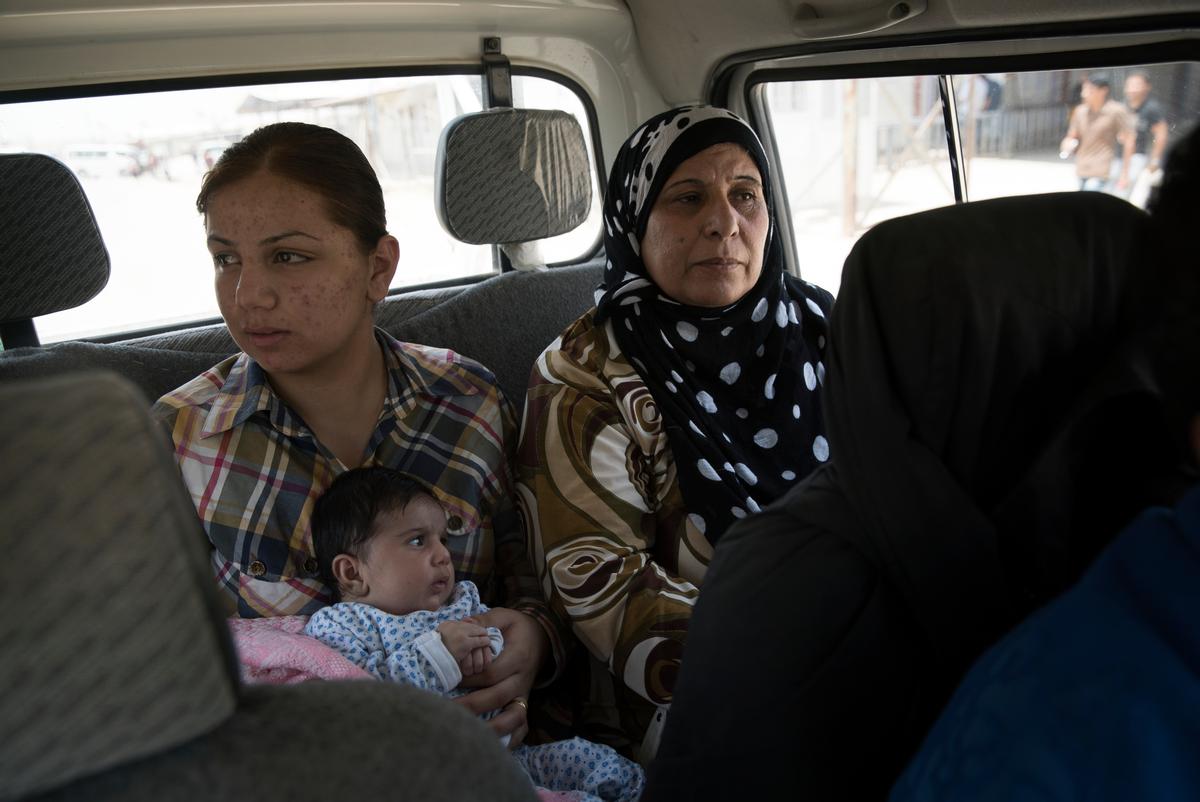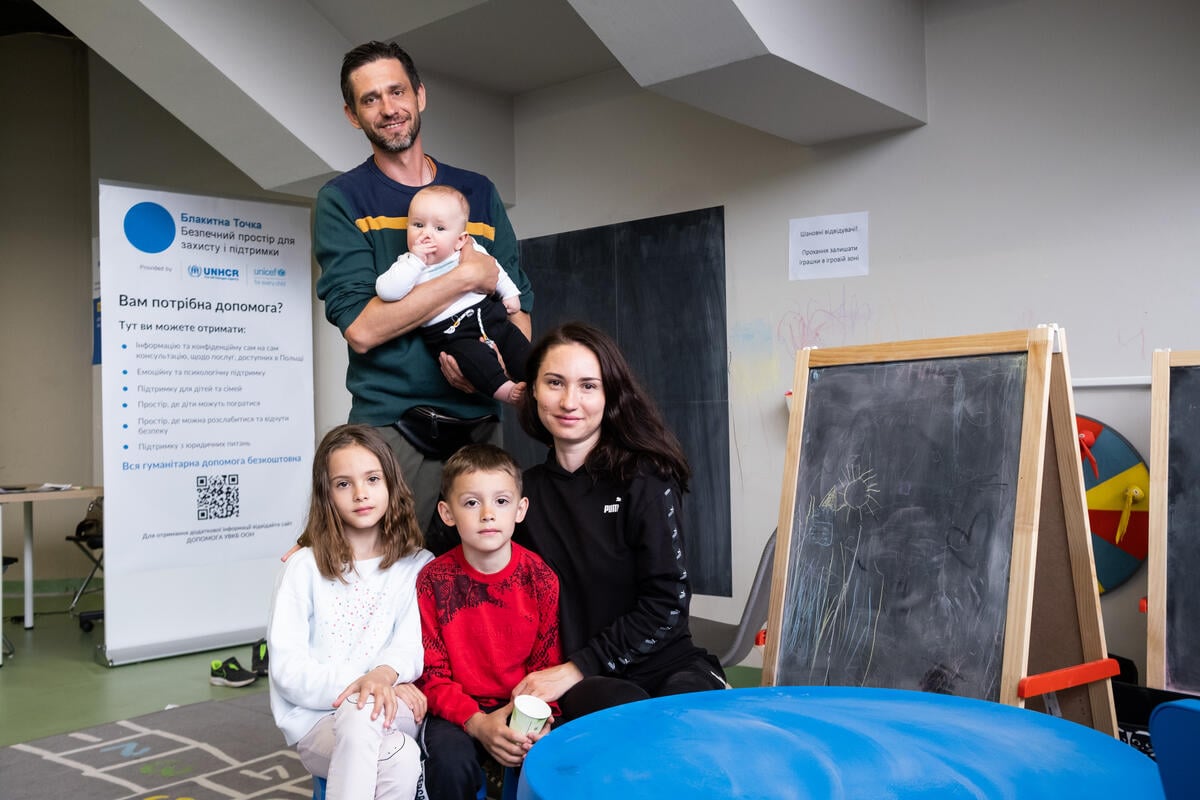A Lonely Birth

A Lonely Birth
Dalia's labour pains began at eight in the morning. Already a mother of five, she told her husband to call a taxi. Together with a neighbour, Rania, they made the 15-minute drive from Faydii refugee camp to a maternal health clinic in nearby Domiz camp, outside Dohuk in Iraq's Kurdistan region.
A team of nurses quickly examined Dalia and led her into the delivery room. Rather than changing into a hospital gown, she rolled off the clothing under her abaya and let her headscarf fall to her shoulders. Rania took a seat by her side and clasped a hand.
"Just be strong my dear," Rania said calmly as Dalia moaned in pain. For the births of her first four children, it was Dalia's sisters and her father's second wife by her side, whispering words of comfort. In Qamishli, her small town in Syria, she knew almost all of the hospital doctors and as soon as word spread that she was having a baby, immediate and extended family converged on the hospital waiting room.
At the clinic in Domiz, it was only Dalia's husband, Sharabi, waiting outside, and Rania, a recent acquaintance, in the delivery room. Compared to giving birth at home in Syria, the experience felt lonely.
"Rania! What's going on?!" Sharabi called down the hall, excited and nervous. "It's fine! She's good, thank God," Rania shouted in reply.
The nurses moved quickly, but calmly. Shuffling in and out of the delivery room, they set out supplies and kept work surfaces clean. After an hour or so of contractions, a French midwife with Doctors Without Borders (MSF) came into the room, calling on a secretary to help her translate. "Tell her to push," the doctor said. "She needs to push harder now."
Rania took Dalia's hand. "Please, God, if not for her then for her children, help her," she whispered.
At 10:32 a.m. Dalia's sixth child, a baby girl named Joza, was born.
"They don't take care of Syrians at all."
Dalia and her husband have lived in Iraq for the past two and a half years. A little over a year ago, before the clinic at Domiz camp was opened, Dalia gave birth to a son on the concrete floor of her tent with only a Syrian midwife in attendance. At that time, the only other affordable option for her was to go to a public Iraqi hospital in a nearby town.
"I never even thought of it," Dalia says of the public hospital option. "They don't take care of Syrians at all." Dalia's concerns about the hospital are echoed by many other pregnant Syrian refugee women. They tell horror stories of botched caesarian sections and uncaring doctors.
A nurse at the Domiz clinic puts it more diplomatically, explaining that "the women, they just feel more comfortable" with the Syrian doctors and nurses. Even small things, like speaking a familiar dialect of Kurdish, can be enormously comforting. Selima has worked as a midwife for 27 years, first in a maternity ward in Syria before she was forced to flee to Iraq two years ago. She began working at the Domiz clinic the week it opened, commuting nearly an hour each way, six days a week. "Even when I'm tired, I still love my work here," Selima says, noting that the clinic averages eight or nine births a day.

During her pregnancy, Dalia says, it was her father's second wife she missed the most. "She was with me for all the others."
Back in her tent with Joza, Dalia says she speaks to her family by phone, but feels further away from them than ever. "I just miss them, I wish they could be here," she says.
Almost all of the women at Domiz clinic were separated from their mothers and sisters when they became refugees. As families fled they split apart, with women often following their husbands and in-laws to safety. Dalia's parents, who are too old to flee, remained in Syria, while her married sisters are with their husbands in Turkey.
Fatima, also from Syria, moved to Iraq's Kurdistan region to live with her husband, Khalil. He had already been living and working in Erbil for the past two years, but wanted to marry a woman from his hometown, Derik. Now just a year after their marriage Fatima is eight months pregnant with their first child.
She says she speaks with her mother and sisters at least three times a week, depending on when the phones and Internet are working in Syria. "She just tells me to be careful, and that I should eat this and not eat that," Fatima says with a smile.
"Actually, they just cry on the phone the entire time," Khalil says, warmly teasing his wife.
Living in Erbil, outside of an organized refugee camp, Fatima doesn't have access to free services like those available at the Domiz maternity clinic. While some public health services in Erbil are free, Fatima prefers to see a Syrian doctor, and that requires visiting a private practice. "It's all very expensive," she says, "even just the transportation, so I only go when I feel like something is hurting or something isn't right."
"I chose her name, Ava, because it means courage."
But regardless of the waves of doubt and uncertainty, Khalil beams when he talks about his expected daughter. "I chose her name, Ava, because it means courage," he says, sitting at his wife's side.
"She told me to choose just a small soft name that has a tune to it. But I promised she will choose next time, for the boy's name!" Khalil says with a laugh. "Honestly, now all we want is a future, a future for my daughter that will be better than our own."

















